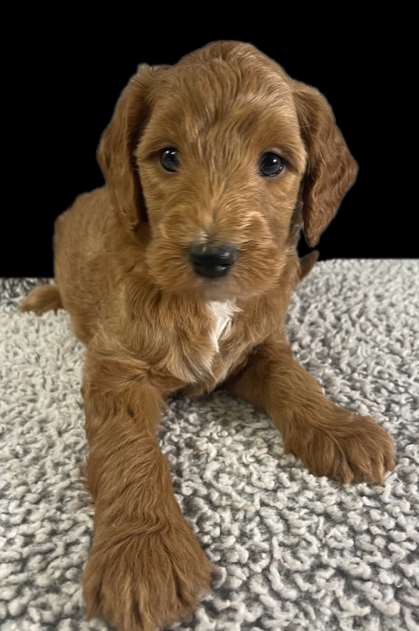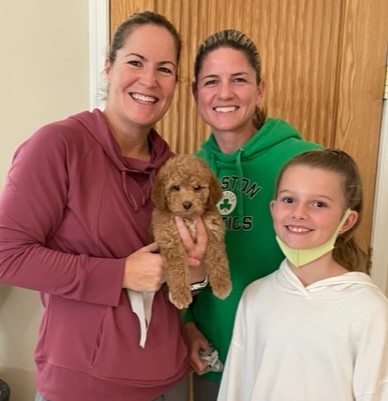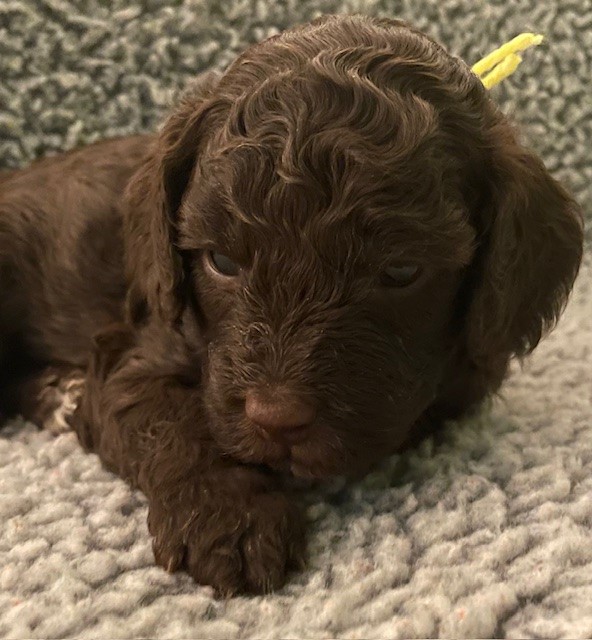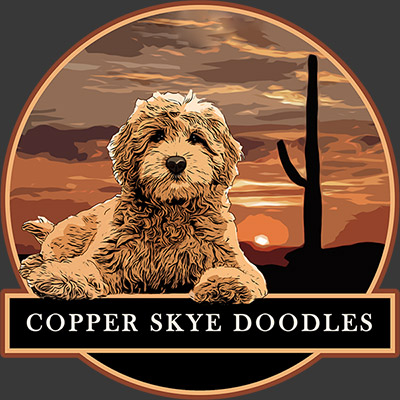Hypoallergenic Goldendoodles in Los Angeles, CA
You may have heard hypoallergenic Goldendoodles are an ideal pet to consider if you are allergic to dogs. This is especially true if you are a dog lover with allergies or have family and friends who have allergies. The reality is there are no completely hypoallergenic dogs. However, dogs with low shedding and minimal dander are the best fit for those who suffer from allergies. You don’t have to give up the search for a furry friend!
The more hypoallergenic Goldendoodles are a cross between a Poodle and a Golden Retriever, with a greater percentage of Poodle genes that result in low shedding. Goldendoodles with more influence from the Golden Retriever genetics, tend to shed more fur and release more dander into their living environment. At Copper Skye Doodles, we aim to breed Goldendoodles with the most suitable coats for those with allergies.
Allergies and Hypoallergenic Goldendoodles in Los Angeles, CA

There are a variety of allergies, and it’s important to identify which specific allergens trigger responses for you or your loved ones. Most allergic reactions to dogs occur in response to saliva, dander or dead skin cells, and urine. Few people are actually allergic to dog hair, it’s the dander or saliva that tend to cause reactions. Hypoallergenic Goldendoodles are less likely to aggravate allergies, because their curly coat prevents the dander from being released as often.
Hypoallergenic Goldendoodles are a great fit often given this label because they cause fewer or less severe allergic reactions. When compared to dogs that shed more frequently and in larger quantities, Goldendoodles stand out. Less dander is released into the air and living space, with less shedding, making Goldendoodles ideal for apartment living in Los Angeles.
Some people are only allergic to pollen or other allergens in the air that may cling to a dog’s coat. Proper grooming and maintaining a shorter coat can help alleviate these issues. Those with mild allergies around dogs tend to notice more hypoallergenic Goldendoodles do not trigger their allergies. You may need to vacuum, dust or clean more frequently when the release of skin cells or dander is likely. While hypoallergenic Goldendoodles cause less of an allergic reaction, it’s important to understand that some Goldendoodles are more or less hypoallergenic than other dogs of the same breed.
Poodle Genes and Hypoallergenic Goldendoodles in Los Angeles, CA USA

There is a range of variety in the hybrid breed of a Goldendoodle. A few factors impact how hypoallergenic Goldendoodles tend to be:
- Genetic makeup
- Generation
- Coat type/shedding
Poodles have a single, curly coat and only shed very lightly. If a Goldendoodle inherits more poodle genes, they are less likely to irritate allergies. The generation also plays a role, since this determines a consistent history of curlier hair and low shedding. The letter B at the end of a generation, meaning Backcross, is a term for breeding the current Goldendoodle generation back to a purebred Poodle, thus giving more Poodle traits with less likelihood of shedding.
“Our mini goldendoodle will be 3 in December, and she’s the best dog we’ve ever had. Deb was great to work with, and we always recommend her to people who ask where we got our doodle.”-Fred W.
F1B and F1BB tend to be the most hypoallergenic Goldendoodle generations:
- F1B Goldendoodles are the first-generation (F1) offspring of a Goldendoodle and a Poodle. This generation produces more hypoallergenic Goldendoodles because they are 75% Poodle and only 25% Golden Retrievers. The F1B generation is a safer option for people who suffer from allergies as an alternative to an F1 Goldendoodle.
- F1BB Goldendoodles are a cross between a Poodle and an F1B Goldendoodle. This generation is 85% Poodle and 15% Golden Retriever. These percentages produce the most hypoallergenic Goldendoodles and are the lowest-risk option for those with allergies.
- If you have allergies, I recommend avoiding an F1 or F2 Goldendoodles, since these dogs are 50% Poodle and 50% Golden Retriever. These generations shed in larger quantities and more frequently because they tend to have straighter hair that releases more dander.
I’m always happy to discuss my most hypoallergenic Goldendoodles with you. I am knowledgeable about the family medical history of each parent—covering coat types, and any health concerns, including dandruff or skin allergies. We can discuss the likelihood of your Goldendoodle expressing specific genes, according to their generation and family background.
Goldendoodle Shedding and Curly Coats in Los Angeles, CA

Goldendoodles inherit curlier coats from their Poodle genes. These curly coats hold dander differently than looser wavy or straight hair. Dander tends to be held closer in the roots of the fur by the curls, preventing its release and resulting in a more hypoallergenic Goldendoodle.
Around six months of age, Goldendoodle puppies will start to shed their puppy coat. As this process begins, they can shed between three times a week and twice a day. They shed less frequently as they grow, and sometimes, the shedding is no longer noticeable in the most hypoallergenic Goldendoodles.
Hypoallergenic Goldendoodles and Reducing Allergen Exposure in Los Angeles, CA

There are steps you can take to reduce your exposure to allergens, in addition to choosing a more hypoallergenic Goldendoodle. These preventative steps will help limit allergic reactions:
- Brush your Goldendoodle regularly.
- Give your pup a bath once or twice a month.
- Plan to clean your home.
- Choose high-quality food for your Goldendoodle.
Brushing your Goldendoodle daily helps spread the oils on the skin evenly to keep dander levels lower. More hypoallergenic Goldendoodles will still benefit from regular brushing since it also prevents matting in their coat. Scheduling regular grooming outside your home every 6-8 weeks will further reduce your exposure. Keeping hair short and maintained reduces the surface area available for dust, dirt, and pollen. It will be easier to wipe or rinse clean your Goldendoodle after a romp outside.
“We adopted our pup Harvey from Copper Skye Doodles right before Covid hit the world – March 2020. We’re thrilled with his personality. Deb made sure we knew what was in store for us, advised us on foods and vitamins, and helped us get the first shots arranged. We got to pick Harvey out of the litter at six weeks old and were excited to bring him home at eight weeks. He’s very smart, active, and was a breeze to train. After two nights with us, he slept through the night. We’re smitten!”-Christine S.
Scheduling a bath for your Goldendoodle once or twice a month will significantly reduce the amount of dander hanging out in their coat. Bathing too often can strip the skin of its natural oil, trigger skin sensitivities, and lead to more dander production. Select a shed control cleanser and a shampoo that keeps their skin moisturized. Dry skin is more likely to become irritated and chafe, producing additional dander.
Adding a few extra steps to cleaning your home can significantly reduce allergy flare-ups, particularly during higher shedding seasons. Dusting or vacuuming around a half hour after brushing will eliminate any excess dander that escapes and settles in a living area. Avoid using carpets that hide allergens. Make sure to keep even hypoallergenic Goldendoodles’ toys and bed clean. Washing these items routinely will prevent dander and saliva accumulation.
Excellent nutrition is another important factor for your Goldendoodle. Selecting foods with Omega 3 and Omega 6 fatty acids can prevent dry, irritated skin and improve your pup’s coat. Liquid supplements or vitamins can be mixed with your dog’s food, but tablets and chews are also available. Feeding your hypoallergenic Goldendoodle a high-quality, balanced, and nutritious diet is important to maintain your dog’s skin health.
Adoption and Hypoallergenic Goldendoodles in Los Angeles, CA
At Copper Skye Doodles, I want to share the joy a Goldendoodle can bring you and your family in Los Angeles. My Goldendoodles are born and raised in Arizona and adapt well to Los Angeles’s more agreeable climate. I’d be happy to talk with you openly about the medical history of your pup’s parents, the probability of a curlier coat, and the genetic background of my most allergy-friendly Goldendoodles. I can also share the experiences of other families who deal with allergies and have been happy with adopting a more hypoallergenic Goldendoodle. These pups are intelligent and adoring, some of the most loving dogs you’ll ever meet. Their gentle nature and abounding patience make them great companions and family dogs in Los Angeles.
I have over 20 years of experience breeding and loving Goldendoodles, and I’d be happy to discuss your hopes and questions with you over the phone. Copper Skye Doodles has an outstanding reputation and has placed hundreds of Goldendoodles into loving homes in the Los Angeles area. I’m happy to take the time to share more with you and learn about which Goldendoodle would fill your heart and home with affection and companionship.

